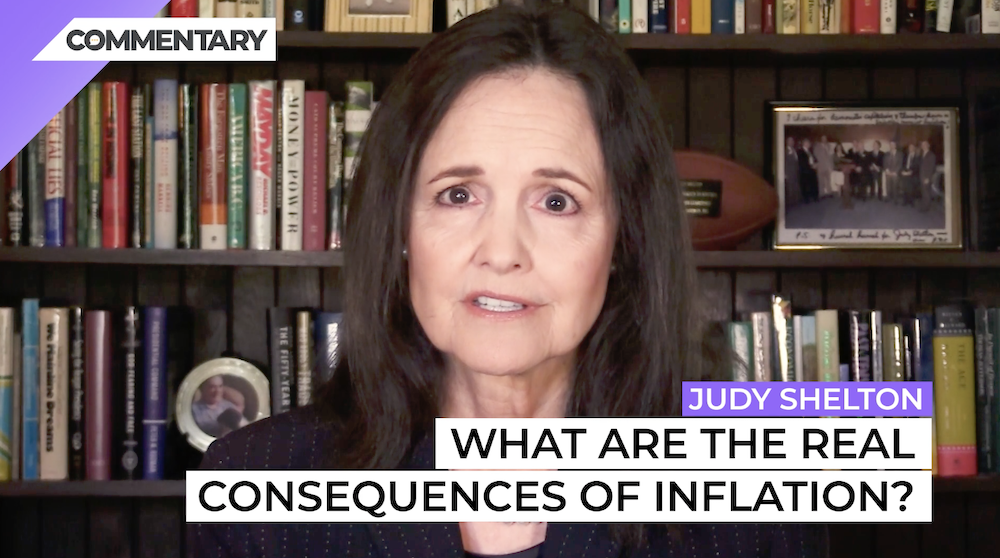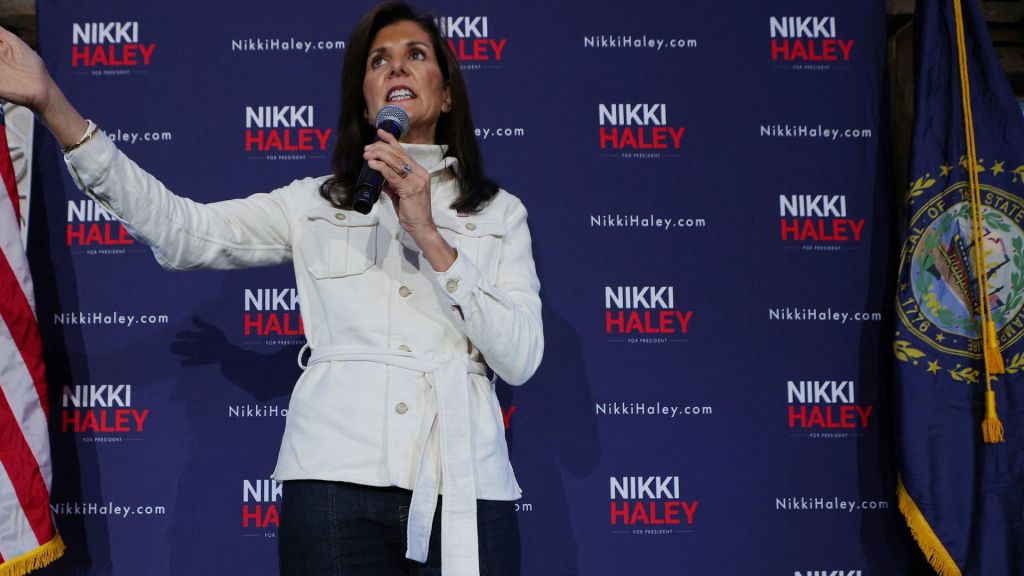
Commentary
-
Our commentary partners will help you reach your own conclusions on complex topics.
Hello and Welcome to Right on the Money. I’m Judy Shelton and here’s my question for you—for all of us: Should we be worried about inflation?
I am not just talking about whether our current “higher” level of inflation will turn out to be a “transitory” problem, or whether it will become a more long-lasting feature.
We should be worried about inflation, of course, because it erodes purchasing power—which makes things particularly difficult if you’re living on a fixed income with a limited budget.
But there are deeper issues here.
Inflation muddles up our economic and financial choices because it distorts price signals. And that undermines the way markets are supposed to work.
It wipes out wage gains when the cost of living goes up.
It makes businesses look like they are profiteering—when they are just trying to keep up with rising prices.
And all these ill effects take their toll by undermining our belief in free-market enterprise…our faith in democratic capitalism.
A nation that embraces individual rights and economic freedom has a moral obligation to ensure sound money.
That’s my position.
It’s a matter of equal treatment under the law.
Money has to work the same way for everyone—which means monetary policy coming from the Federal Reserve cannot be seen as favoring big investors, big business, and big government.
Yet it seems clear that monetary policy has been delivering financial rewards to some at the expense of others.
The near-zero interest rates engineered by the Federal Reserve were meant to incentivize companies to make long-term capital investments leading to more jobs, more hiring, and greater output.
But that model broke down long ago.
Creating jobs is not the problem these days; the problem is filling those jobs. The Fed can’t do much about that.
Instead, all that easy money is going into further enlarging stock portfolios, facilitating corporate buybacks, and bankrolling federal budget deficits.
Liquidity that pumps up markets and encourages irresponsible spending in Washington muddies the waters, exacerbates inequality, and accommodates bad governance.
While productive economic growth may have been the Fed’s objective, the benefits of monetary “stimulus” have dissipated.
Now we’re dealing with the hangover of excess reserves piling up in the depository accounts of commercial banks kept at the Fed, along with excess cash sloshing around global financial markets.
Monetary authorities try to ring-fence that cash through such contrivances as paying interest to banks for keeping the funds sitting dormant at the Fed, and by allowing money-market funds to park cash at the Fed’s overnight reverse repo facility—to the tune of some $1.6 trillion daily.
It’s a sad spectacle. Our central bank has unleashed inflation and now uses mechanisms that amount to playing with money as opposed to letting accurate price signals channel precious financial capital to its most productive use.
The Fed’s practices actually discourage bank loans to the private sector—whether to small business owners or visionary entrepreneurs, the people who create real jobs.
Banks seem all too happy just to trade cash and Treasury debt back-and-forth with the Fed, making thin profits on huge volumes.
The people who make decisions for the Federal Reserve may have good intentions…but in my view, they have not been right on the money.
-
Inflation robs us of more than wage gains
Rising prices make it hard to get by when you live on a fixed budget. Even if you manage to raise your wages, inflation that increases at a faster pace than your salary means that you end up with less purchasing power. The negative aspects of inflation go even deeper than just squeezing the margin…
-
The Federal Reserve has too much power over the economy
Federal reserve officials exert too much influence over financial markets and economic outcomes. It’s time to confront the increasing dominance of our central bank.
-
The Fed’s definition of stable prices is inflationary
Just because you’ve received a raise doesn’t mean your buying power is greater, and lately you may be feeling the financial squeeze more than ever. Monetary Economist and Straight Arrow News Contributor Judy Shelton says the government’s inflation policy has something to do with it. She’s asking: Is the Federal Reserve Right On The Money™…
Latest Stories
-

Supreme Court justices split over Idaho’s abortion law
-
 Getty Images
Getty Images
Businesses sue over FTC ban on noncompetes
-
 Getty Images
Getty Images
National Enquirer ex-publisher: Tabloid made up stories to help Trump
-
 Getty Images
Getty Images
Bird flu fallout: USDA says milk is safe, states must test dairy herds
-
 Getty Images
Getty Images
Biden administration cracks down on flight refunds and hidden fees
Popular Opinions
-
In addition to the facts, we believe it’s vital to hear perspectives from all sides of the political spectrum.
Latest Opinions
In addition to the facts, we believe it’s vital to hear perspectives from all sides of the political spectrum. We hope these different voices will help you reach your own conclusions.
The opinions published in this section are solely those of the contributors and do not reflect the views of Straight Arrow News.

















Latest Commentary
We know it is important to hear from a diverse range of observers on the complex topics we face and believe our commentary partners will help you reach your own conclusions.
The commentaries published in this section are solely those of the contributors and do not reflect the views of Straight Arrow News.
Peter Zeihan
Geopolitical StrategistPeace between Israel and Iran, at least for now
Global internet in a precarious state, but that could be a positive
Water wars are an unlikely future
Dr. Frank Luntz
Pollster and Political Analyst‘Take the job seriously’: Why Americans are fed up with Congress
‘If we can shrink it, it will stop growing’: Americans talk debt, deficit
‘I don’t think they care’: Undecided voters explain their reasons
Pete Ricketts
U.S. Senator for Nebraska